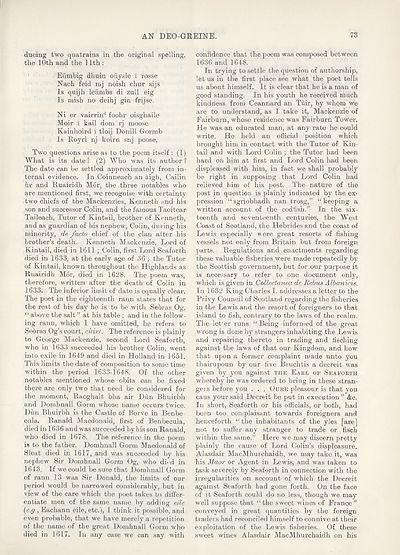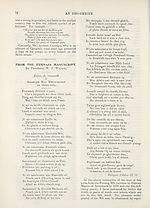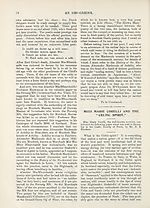An Comunn Gàidhealach Publications > Deo-gréine > Volume 13, October 1917-September 1918
(81) Page 73
Download files
Complete book:
Individual page:
Thumbnail gallery: Grid view | List view

AN DEO-GREINE.
73
ducing two quatrains in the original spelling,
the 10th and the 11th :
Eumbig dhuin ouysle i rosse
Nach feid mj noish chut sijs
Is quijh leumbs di zull eig
Is mish no deihj gin frijse.
Ni er vairrind foohr oisghaile
Moir I kail dom rj moose
Kainhoird I tloij Donill Gormb
Is Royri nj koirn snj poose,
Two questions arise as to the poem itself : (1)
What is its date? (2) Who was its author?
The date can be settled approximately from in¬
ternal evidence. In Coinneach an aigh, Cailin
ur and Ruairidh M6r, the three notables who
are mentioned first, we recognise with certainty
two chiefs of the Mackenzies, Kenneth and his
son and successor Colin, and the famous Taoitear
Taileach, Tutor of Kintail, brother of Kenneth,
and as guardian of his nephew, Colin, during his
minority, de facto chief of the clan alter his
brother’s death. Kenneth Mackenzie, Lord of
Kintail, died in 1611; Colin, first Lord Seaforth
died in 1633, at the early age of 36 ; the Tutor
of Kintail, known throughout the Highlands as
Ruairidh M6r, died in 1628. The poem was,
therefore, written after the death of Colin in
1633. The inferior limit of date is equally clear.
The poet in the eighteenth rann states that for
the rest of his day he is to be with Sebras Og,
“ above the salt ” at his table; and in the follow¬
ing rann, which I have omitted, he refers to
Sebras Og’s court, cuir/. The reference is plainly
to George Mackenzie, second Lord Seaforth,
who in 1633 succeeded his brother Colin, went
into exile in 1649 and died in Holland in 1651.
This limits the date of composition to some time
within the period 1633-1648. Of the other
notables mentioned whose obits can be fixed
there are only two that need be considered for
the moment, Raoghalt bha air Dun Bhuirbh
and Domhnall Gorm whose name occurs twice.
Dim Bhuirbh is the Castle of Borve in Benbe
cula. Ranald Macdonald, first of Benbecula,
died in 1636 and was succeeded by his son Ranald,
who died in 1678. The reference in the poem
is to the father. Domhnall Gorm Macdonald of
Sleat died in 1617, and was succeeded by his
nephew Sir Domhnall Gorm Og, who dLd in
1643. If we could be sure that Domhnall Gorm
of rann 13 was Sir Donald, the limits of our
period would be narrowed considerably, but in
view of the care which the poet takes to differ¬
entiate men of the same name by adding eile
(e.gr., Eachann eile, etc.), I think it possible, and
even probable, that we have merely a repetition
of the name of the great Domhnall Gorm who
died in 1617. In any case we can say with
confidence that the poem was composed between
1636 and 1648.
In trying to settle the question of authorship,
let us in the first place see what the poet tells
us about himself. It is clear that he is a man of
good standing. In his youth he received much
kindness from Ceannard an Tuir, by whom we
are to understand, as I take it, Mackenzie of
Eairburn, whose residence was Eairburn Tower.
He was an educated man, at any rate he could
write. He held an official position which
brought him in contact with the Tutor of Kin¬
tail and with Lord Colin; the Tutor had been
hard oh him at first and Lord Colin had been
displeased with him, in fact we shall probably
be right in supposing that Lord Colin had
relieved him of his post. The nature of the
post in question is plainly indicated by the ex¬
pression “ sgriobhadh nan trosg,” “ keeping a
written account of the codfish.” In the six¬
teenth and seventeenth centuries, the West
Coast of Scotland, the Hebrides and the coast of
Lewis especially were great resorts of fishing
vessels not only from Britain but from foreign
parts. Regulations and enactments regarding
these valuable fisheries were made repeatedly by
the Scottish government, but for our purpose it
is necessary to refer to one document only,
which is given in Collectanea de Rebus Albanicis.
In 1632 King Charles I. addresses a lettey to the
Privy Council of Scotland regarding the fisheries
in the Lewis and the resort of foreigners to that
island to fish, contrary to the laws of the realm.
The let'er runs “Being informed of the great
wrong is done by strangers inhabiting the Lewis
and repairing thereto in trading and fisching
against the laws of that our Kingdom, and how
that upon a former complaint made unto you
thairupoun by our five Bruchtis a decreit was
given by you against the Earl of Seaforth
whereby he was ordered to bring in these stran¬
gers before you . . . Cure pleasour is that you
caus your said Decreit be put in execution ” <fcc.
In short, Seaforth or his officials, or both, had
been too complaisant towards foreigners and
henceforth “ the inhabitants of the yles [are]
not to suffer any stranger to trade or fisch
within the same.” Here we may discern pretty
plainly the cause of Lord Colin’s displeasure.
Alasdair MacMhurchaidh, we may take it, was
his Moor or Agent in Lewis, and was taken to
task severely by Seaforth in connection with the
irregularities on account of which the Decreit
against Seaforth had gone forth. On the face
of it Seaforth could do no less, though we may
well suppose that “ the sweet wines of France ”
conveyed in great quantities by the foreign
traders had reconciled himself to connive at their
exploitation of the Lewis fisheries. Of these
sweet wines Alasdair MacMhurchaidh on his
73
ducing two quatrains in the original spelling,
the 10th and the 11th :
Eumbig dhuin ouysle i rosse
Nach feid mj noish chut sijs
Is quijh leumbs di zull eig
Is mish no deihj gin frijse.
Ni er vairrind foohr oisghaile
Moir I kail dom rj moose
Kainhoird I tloij Donill Gormb
Is Royri nj koirn snj poose,
Two questions arise as to the poem itself : (1)
What is its date? (2) Who was its author?
The date can be settled approximately from in¬
ternal evidence. In Coinneach an aigh, Cailin
ur and Ruairidh M6r, the three notables who
are mentioned first, we recognise with certainty
two chiefs of the Mackenzies, Kenneth and his
son and successor Colin, and the famous Taoitear
Taileach, Tutor of Kintail, brother of Kenneth,
and as guardian of his nephew, Colin, during his
minority, de facto chief of the clan alter his
brother’s death. Kenneth Mackenzie, Lord of
Kintail, died in 1611; Colin, first Lord Seaforth
died in 1633, at the early age of 36 ; the Tutor
of Kintail, known throughout the Highlands as
Ruairidh M6r, died in 1628. The poem was,
therefore, written after the death of Colin in
1633. The inferior limit of date is equally clear.
The poet in the eighteenth rann states that for
the rest of his day he is to be with Sebras Og,
“ above the salt ” at his table; and in the follow¬
ing rann, which I have omitted, he refers to
Sebras Og’s court, cuir/. The reference is plainly
to George Mackenzie, second Lord Seaforth,
who in 1633 succeeded his brother Colin, went
into exile in 1649 and died in Holland in 1651.
This limits the date of composition to some time
within the period 1633-1648. Of the other
notables mentioned whose obits can be fixed
there are only two that need be considered for
the moment, Raoghalt bha air Dun Bhuirbh
and Domhnall Gorm whose name occurs twice.
Dim Bhuirbh is the Castle of Borve in Benbe
cula. Ranald Macdonald, first of Benbecula,
died in 1636 and was succeeded by his son Ranald,
who died in 1678. The reference in the poem
is to the father. Domhnall Gorm Macdonald of
Sleat died in 1617, and was succeeded by his
nephew Sir Domhnall Gorm Og, who dLd in
1643. If we could be sure that Domhnall Gorm
of rann 13 was Sir Donald, the limits of our
period would be narrowed considerably, but in
view of the care which the poet takes to differ¬
entiate men of the same name by adding eile
(e.gr., Eachann eile, etc.), I think it possible, and
even probable, that we have merely a repetition
of the name of the great Domhnall Gorm who
died in 1617. In any case we can say with
confidence that the poem was composed between
1636 and 1648.
In trying to settle the question of authorship,
let us in the first place see what the poet tells
us about himself. It is clear that he is a man of
good standing. In his youth he received much
kindness from Ceannard an Tuir, by whom we
are to understand, as I take it, Mackenzie of
Eairburn, whose residence was Eairburn Tower.
He was an educated man, at any rate he could
write. He held an official position which
brought him in contact with the Tutor of Kin¬
tail and with Lord Colin; the Tutor had been
hard oh him at first and Lord Colin had been
displeased with him, in fact we shall probably
be right in supposing that Lord Colin had
relieved him of his post. The nature of the
post in question is plainly indicated by the ex¬
pression “ sgriobhadh nan trosg,” “ keeping a
written account of the codfish.” In the six¬
teenth and seventeenth centuries, the West
Coast of Scotland, the Hebrides and the coast of
Lewis especially were great resorts of fishing
vessels not only from Britain but from foreign
parts. Regulations and enactments regarding
these valuable fisheries were made repeatedly by
the Scottish government, but for our purpose it
is necessary to refer to one document only,
which is given in Collectanea de Rebus Albanicis.
In 1632 King Charles I. addresses a lettey to the
Privy Council of Scotland regarding the fisheries
in the Lewis and the resort of foreigners to that
island to fish, contrary to the laws of the realm.
The let'er runs “Being informed of the great
wrong is done by strangers inhabiting the Lewis
and repairing thereto in trading and fisching
against the laws of that our Kingdom, and how
that upon a former complaint made unto you
thairupoun by our five Bruchtis a decreit was
given by you against the Earl of Seaforth
whereby he was ordered to bring in these stran¬
gers before you . . . Cure pleasour is that you
caus your said Decreit be put in execution ” <fcc.
In short, Seaforth or his officials, or both, had
been too complaisant towards foreigners and
henceforth “ the inhabitants of the yles [are]
not to suffer any stranger to trade or fisch
within the same.” Here we may discern pretty
plainly the cause of Lord Colin’s displeasure.
Alasdair MacMhurchaidh, we may take it, was
his Moor or Agent in Lewis, and was taken to
task severely by Seaforth in connection with the
irregularities on account of which the Decreit
against Seaforth had gone forth. On the face
of it Seaforth could do no less, though we may
well suppose that “ the sweet wines of France ”
conveyed in great quantities by the foreign
traders had reconciled himself to connive at their
exploitation of the Lewis fisheries. Of these
sweet wines Alasdair MacMhurchaidh on his
Set display mode to:
![]() Universal Viewer |
Universal Viewer | ![]() Mirador |
Large image | Transcription
Mirador |
Large image | Transcription
| An Comunn Gàidhealach > An Comunn Gàidhealach Publications > Deo-gréine > Volume 13, October 1917-September 1918 > (81) Page 73 |
|---|
| Permanent URL | https://digital.nls.uk/125233073 |
|---|
| Description | Leabhar 13, Mìos Deireannach an Fhogharaidh 1917 gu Darna Mìos an Fhogharaidh 1918 |
|---|---|
| Attribution and copyright: |
|
| Description | This contains items published by An Comunn, which are not specifically Mòd-related. It includes journals, annual reports and corporate documents, policy statements, educational resources and published plays and literature. It is arranged alphabetically by title. |
|---|
| Description | A collection of over 400 items published by An Comunn Gàidhealach, the organisation which promotes Gaelic language and culture and organises the Royal National Mòd. Dating from 1891 up to the present day, the collection includes journals and newspapers, annual reports, educational materials, national Mòd programmes, published Mòd literature and music. |
|---|---|
| Additional NLS resources: |
|

